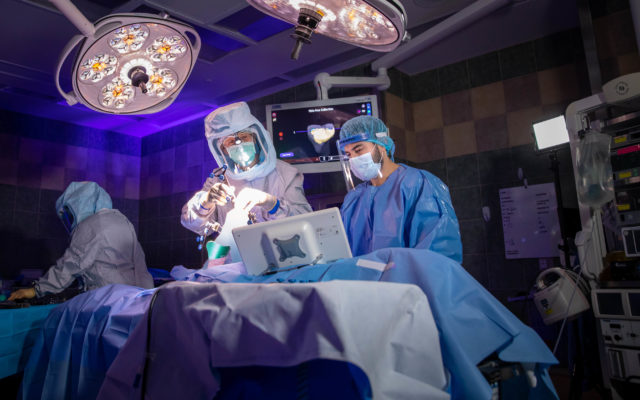First Robotics-Assisted Knee Replacement Performed in Midland

The American Academy of Orthopedic Surgeons estimates knee replacement surgeries are expected to increase a staggering 180 percent between now and 2030 in the United States. In preparation for this dramatic increase, MidMichigan Medical Center – Midland recently expanded its comprehensive musculoskeletal offerings to include robotics-assisted knee surgery. Orthopedic Surgeon Mark Goethe, M.D., recently performed MidMichigan’s very first robotics-assisted knee replacement surgery using the CORITM Surgical System. This unique system, developed by Smith+Nephew, uses handheld robotics-assisted technology designed to help orthopedic surgeons plan and perform total and partial knee replacement procedures.
“This system allows us to create a customized 3D digital model of the patient’s knee,” said Dr. Goethe. “Having this three-dimensional view helps us finalize and verify the selection of the patient’s knee implant and create a plan for their surgery without the need for either a CT scan or MRI. It also helps us achieve more accurate positioning of the knee implant based on the patient’s unique anatomy and sends information about the patient’s knee to the robotics-assisted hand piece at more than 300 times per second.”
According to Dr. Goethe, the device allows him to remove arthritic damaged cartilage and bone surfaces, balance the soft tissues around the joint, and more accurately position the appropriately sized implant for better overall alignment. “The result is a neutral mechanically-aligned knee joint made from material designed to last longer and feel like the patient’s own knee,” he added.
Robotics-assisted knee replacement surgery using the CORI Surgical System combined with the features and benefits of Smith+Nephew’s implant can lead to the following patient benefits:
- Quicker, smoother recovery1
- Regain function faster and return home sooner2
- The surgeon is able to create a unique surgical plan by using 3D digital modeling to get a plan customized to the patients’ unique anatomy. This means the surgeon can perform the procedure more accurately than traditional knee replacement surgery.3,4
- A natural fit. Using these technologies patients can keep more of their natural bone and ligaments, including the ACL.5 This helps maintain more of a natural rhythm and step.6
- The surgeon is able to choose from the widest selection of implants available, so implants can be precision-matched to feel more like a patient’s own knee.
“We are very excited to bring this advanced technology to the Great Lakes Bay Region,” said Orthopedic Surgeon John Murphy, D.O., musculoskeletal service line chief for MidMichigan Health. “We are offering robotics-assisted surgery based on the overall potential benefits to our patients. Robotics-assisted knee replacements can be performed by your MidMichigan orthopedic surgeon. We encourage you to discuss options with your orthopedic surgeon to determine the best plan for you.”
Those who would like more information about robotics-assisted knee replacement surgery may visit www.midmichigan.org/roboticskneesurgery.
References:
1. Based on JOURNEY II family of implants. Mayman DJ, Patel AR, Carroll KM. Hospital related clinical and economic outcomes of a bicruciate knee system in total knee arthroplasty patients. Poster presented at: ISPOR Symposium; May 19-23, 2018; Baltimore, Maryland, USA.
2. Based on UKA surgery. Shearman AD, et al. EKS Arthroplasty Conference. May 2-3, 2019; Valencia, Spain.
3. Batailler C, White N, Ranaldi FM, Neyret P, Servien E, Lustig S. Improved implant position and lower revision rate with robotic-assisted unicompartmental knee arthroplasty. Knee Surg Sports Traumatol Arthros. 2019;27(4):1232-1240
4. Gregori A, Picard F, Lonner JH, Smith JR, Jaramaz B. Accuracy of Imageless Robotically Assisted Unicondylar Knee Arthroplasty. International Society for Computer Assisted Orthopaedic Surgery (CAOS) 15th Annual Meeting;2015; Vancover, Canada
5. Combination of CORI along with the JOURNEY II XR
6. Pritchett JW. Patients prefer a bicruciate-retaining or the medial pivot total knee prosthesis. J Arthroplasty. 2011;26(2):224-228
00225 V3 JOURNEY II Design Rationale 11/17
06791 V1 JOURNEY II XR Design Rationale 10/17



